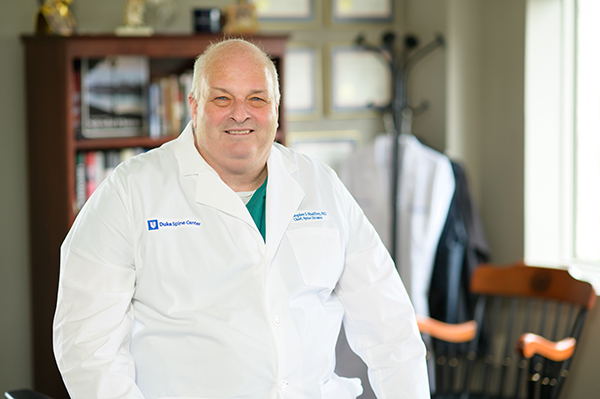Awake and Advanced: Duke Pioneers Ultra-Minimally Invasive Spine Surgery
“Endoscopic spine surgery is an ultra-minimally invasive approach to spine surgery that utilizes an endoscope to perform operations that previously required larger incisions,” said David Huie, MD. “It is one of the newest areas of spine surgery, and we are excited to be offering it here at Duke.”
Decreasing the amount of tissue disruption associated with surgery means decreased risk of complications like infection, bleeding, and wound healing issues. The minimally invasive technique allows patients to recover faster with fewer pain medications.
“The minimally invasive nature of endoscopic surgery also means that some surgeries can be performed with patients awake, thereby eliminating the risks associated with general anesthesia, and making this surgery available to patients who might not otherwise be surgical candidates,” Huie said.
Duke is currently one of the few centers in the world offering awake endoscopic spine surgery, including endoscopic fusions in appropriate patients.
“In addition to being a leader in clinical endoscopic spine surgery, the Duke team is also a leader in research as it relates to endoscopic spine surgery,” said Duke neurosurgeon Muhammad Abd-El-Barr, MD, PhD.

Reducing Revisions: Cervical Disc Replacement
Cervical disc replacement surgeries significantly decrease the number of future surgeries needed to treat neck problems compared to the previous standard of cervical fusion, according to Duke spine neurosurgeon Deb Bhowmick, MD.
At Duke, one- and two-level surgeries are being completed as outpatient procedures.
“We also use more than four different makes of the devices, studying the different impact on spine mobility and gait,” said Bhowmick.
Bhowmick said the long-term benefits from cervical arthroplasty have only been shown in large scale clinical studies in the past five years. Duke neurosurgeons perform both cervical and lumbar disc arthroplasty.
In addition to Bhowmick, other Duke practitioners using this technique are Muhammad Abd-El-Barr, MD, PhD; John C. Barr, MD; Parastou Quist, MD; and Peter M. Grossi, MD.
Spine Chief Awarded Cushing Medal

Christopher Shaffrey, MD, chief of Duke Spine, was awarded the Harvey Cushing Medal by the American Association of Neurological Surgeons (AANS) at their annual meeting in Chicago, May 3-5, 2024.
The award is the highest that the AANS can bestow on a member. It recognizes distinguished service and accomplishments in neurosurgery as well as extraordinary efforts to advance the field. The award's namesake, Harvey Cushing, is considered "the father of modern neurological surgery."
Shaffrey is a tenured professor in the departments of Neurosurgery and Orthopedic Surgery at Duke University School of Medicine. He has been chief of the Spine Division since 2018.
He is a world-renowned physician-scientist who has an active research interest in spinal surgery, particularly in multicenter research studies of pediatric and adult scoliosis, spinal cord injury, spinal trauma, spinal degenerative conditions, and tumors involving the spinal column.
Pioneering Neuromodulation and Neurorestoration to Treat Spinal Cord Injuries
An innovative, NIH-funded clinical trial led by Nandan Lad, MD, PhD, promises to advance neuromodulation and neuro-restoration for patients with spinal cord injuries.
The trial, Spinal Cord Stimulation for Spinal Cord Injury (SCS for SCI), explores the use of SCS as a therapeutic approach to enhance motor, sensory, and autonomic function in people with thoracic SCI. Through advanced neuromodulation techniques, SCS addresses chronic pain while also facilitating functional recovery in areas such as bowel and bladder control, which profoundly impact patients’ quality of life.
The study employs dual-lead technology, with one lead targeting chronic pain and another positioned over the conus medullaris to stimulate neuroplasticity and recovery mechanisms. Preliminary findings suggest promising signals of improvement in motor, sensory, and bowel/bladder function, paving the way for future innovations in neurorehabilitation.
This trial represents a vital step toward redefining neuro-restoration for SCI patients by integrating advanced technologies and evidence-based therapies. It also lays the groundwork for follow-on studies involving detailed electromyography mapping, transcranial magnetic stimulation, and urodynamics to further quantify outcomes and refine therapeutic interventions.
Year in Review Chapters
HOME / BRAIN TUMOR / CEREBROVASCULAR AND SKULL BASE / FUNCTIONAL / SPINE / PEDIATRIC / BRAIN AND SPINE METASTASIS / TRAUMA / GLOBAL / TOP PAPERS / RESIDENT HONORS